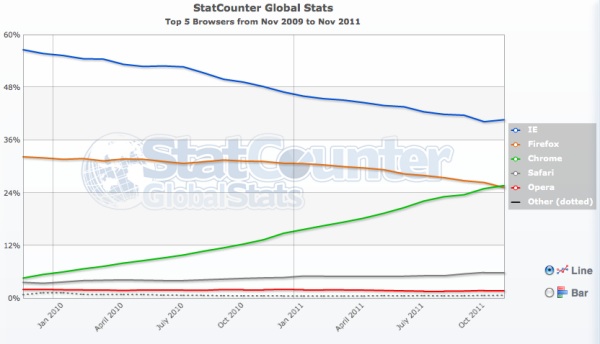With Chrome Ascendant, Mozilla Is a Dead Man Walking
Update: Mozilla responds – it’s in full at the bottom of this post. They would like you to know that Google doesn’t own them, even though they derive the bulk of their revenue from the search giant. I’d like you to know that as well, and I’ve updated the text to make it clear to those coming to this saga late that Mozilla is in fact an independent not-for-profit.

In terms of revenue, the independent not-for-profit Mozilla foundation, maker of the open source Firefox browser, might as well be a wholly owned subsidiary of Google. Through a deal in which Google is the default search engine for Firefox, the search giant provided 84% of Mozilla’s revenue in 2010, according to its annual report (pdf). That’s more than $100 million.
Now that Google’s own Chrome browser is beating Firefox in the browser wars for the first time ever, how much longer is Google going to be able to justify propping up the nonprofit foundation behind what is increasingly an also-ran browser? It’s not just the success of Chrome that’s at issue here, but also the rapidly expanding portion of the browsing pie being eaten up by browsers on mobile devices – where Firefox is basically persona non grata.
I can already hear the howls of protest from Firefox diehards – “Firefox is the most customizable, secure browser on the planet!” That’s true, and in this age of less-is-more interfaces and operating systems, totally irrelevant. The overwhelming majority of users want speed and simplicity – that’s why they install Chrome and never look back.
Google no longer needs need Firefox as a cudgel for convincing Microsoft to support web standards, because Chrome, Safari and mobile browsers are accomplishing that already. To the credit of the team at Mozilla, the web is winning, even in the face of an ongoing onslaught from native apps.
Mozilla continues to push the envelope in a lot of other ways that Google may find interesting, but to the tune of $100 million a year? If Google wants to do launch new efforts to manage online identity to thwart competitors like Facebook, it’s a hundred times as likely to succeed if it deploys those technologies through its own channels.
And this is exactly what Google is doing, in the form of Google+. As for other Mozilla efforts, it’s difficult to think of anything the foundation is doing that Google isn’t also doing, and more successfully, whether it’s sync across browsers or its Chrome OS attempt to turn the browser into an OS.
Given the quantitative trends in browser share and the qualitative trends in feature roll-outs, Mozilla’s work appears increasingly redundant for its primary benefactor. Mozilla publicly expresses confidence that its special relationship with Google will continue, but it has also said that it would like to further diversify its revenue streams.
Where is that money going to come from? As its share of the market declines, so does the value of search traffic Firefox can send. And would its users really leave the default intact if Firefox shipped with its search field pointing to Bing or Yahoo? With all due respect to the management at Mozilla, imagining that things like grants, which represented only about $1 million in revenue for Mozilla in 2010, will fill the breach is sheer hubris.
Mozilla’s response:
Wanted to clarify a few things that didn’t come across in your piece:
1. Mozilla is an independent entity. We are a non-profit organization. We are not a subsidiary of another organization.
2. Mozilla has a long-standing, mutually beneficial business relationship with Google. The relationship is based on search functionality within Firefox. Mozilla has business relationships with a number of other search providers including Bing, Yahoo!, Yandex and others.
To which I’d append: If I’m reading their annual report correctly, those business relationships with other search providers constitute no more than 15% of Mozilla’s revenue.
Keep Reading
Most Popular
Large language models can do jaw-dropping things. But nobody knows exactly why.
And that's a problem. Figuring it out is one of the biggest scientific puzzles of our time and a crucial step towards controlling more powerful future models.
How scientists traced a mysterious covid case back to six toilets
When wastewater surveillance turns into a hunt for a single infected individual, the ethics get tricky.
The problem with plug-in hybrids? Their drivers.
Plug-in hybrids are often sold as a transition to EVs, but new data from Europe shows we’re still underestimating the emissions they produce.
Google DeepMind’s new generative model makes Super Mario–like games from scratch
Genie learns how to control games by watching hours and hours of video. It could help train next-gen robots too.
Stay connected
Get the latest updates from
MIT Technology Review
Discover special offers, top stories, upcoming events, and more.